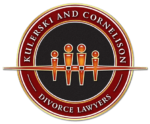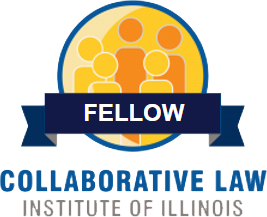In short, Collaborative Divorce Law is a way for soon-to-be ex-spouses to settle their amicable divorces smoothly, quickly, privately, less expensively, and without using the court system (except for a brief, non-adversarial ten-minute Hearing at the end when a judge enters their final judgment).
Why Choose Collaborative Divorce in DuPage County, IL?
Collaborative Divorce allows spouses and their attorneys to work together to reach a mutually beneficial agreement without going to court. Here are five big reasons to consider it:
- Saves Money: Avoids expensive litigation by focusing on realistic, non-adversarial resolutions.
- Reduces Trauma: Attorneys and professionals help both parties be heard, ensuring a supportive environment.
- Saves Time: Collaborative divorces in DuPage County can be completed in months, not years.
- Reduces Animosity: Focuses on solutions rather than blame, minimizing conflict.
- More Private: Keeps personal financial details out of public records.
No other professional dispute resolution method is consistently as efficient and economical as collaborative law.
What Is Collaborative Law?
Collaborative law is a new way to handle legal disputes, focusing on settlement without court involvement. Both parties hire “settlement only” lawyers to help reach an acceptable resolution. If a settlement can’t be reached, the collaborative lawyers withdraw, and new attorneys take over if needed.
Key Benefits:
- No Court Intrusion: Lawyers work to prevent problems from escalating, focusing on non-adversarial strategies.
- Control Over Outcome: Spouses have total control over the process, including timing, outcome, and cost.
- Efficient and Economical: Collaborative law is often quicker and cheaper than traditional litigation.
Why Kulerski & Cornelison?
Kulerski & Cornelison brought Collaborative Divorce to Illinois in 1999 and was the first divorce law firm in Illinois to advocate and promote it. With years of experience and a commitment to minimizing the emotional and financial toll of divorce, we are here to help you navigate this challenging time.
COLLABORATIVE LAW GIVES SPOUSES TOTAL CONTROL OVER WHAT IS HAPPENING.
Both parties still hire their own lawyers but the lawyers serve as “settlement only” lawyers who sit down with the parties at group conferences and do everything they can to help produce an acceptable resolution. THERE IS NO COURT INTRUSION. The lawyers “put their money where their mouth is” and agree to be fired if the parties can’t reach a settlement. If that happens, the parties would then be free to proceed (with new attorneys) into the very legal system that they initially sought to avoid. This does not double the legal fees. Much of the work is transferable and does not have to be done again by the new lawyers. The collaborative attorneys help to make the transition a smooth one.
THERE IS NO COURT INTRUSION.
Lawyers working within the collaborative law model still provide the same degree of advocacy required of all lawyers, but they now employ non-adversarial tools and techniques. The lawyers receive training in managing conflict and in the use of cooperative and non-confrontational strategies. They act to minimize and remove the typical impediments to settlement, and they act to ensure that the legal system itself does not derail the chances of an amicable resolution.
In collaborative law, there are no adversarial courtroom proceedings, no traumatic hearings, and no provocative declarations. Both attorneys intentionally do everything they can to prevent problems from escalating. If both parties have “good will” and are committed to trying to settle, then the path is cleared for them.
NO ADVERSARIAL COURTROOM PROCEEDINGS, NO TRAUMATIC HEARINGS, NO PROVOCATIVE DECLARATIONS.
Our traditional legal system is based on the assumption that the parties are adversaries and will stay so throughout the process. A direct by-product of this process is a competitive “win-die” approach to negotiation. The system requires the parties to see each other as opponents. They enter the litigation process with gladiator expectations and are greeted with the same attitude. This often exacerbates the negative emotions and feelings the parties may have for each other.
Settlement is not a priority in our present system, but winning is. Settlements are reached but are often reached very close to (or on the eve of) trial. By that time, the parties are disillusioned by the legal process and complain that they have exhausted their spirits and their funds.
HAVE YOU EVER MET ANYONE WHO DOESN’T THINK LITIGATION TAKES TOO LONG & COSTS TOO MUCH?
The fact is that over 90% of all divorce cases settle without going to trial. Litigants routinely spend months preparing for a trial that (statistically, at least) isn’t going to happen. Proponents of collaborative law believe that the energy that was formerly used in preparing to litigate should now be used (at the front end of the process) in trying to settle.
Collaborative law provides spouses with an opportunity to be heard and gives them control over what is happening to them. They are not “out of the loop” but are, indeed, the main characters (and not mere spectators) in their own dramas.
OVER 90% OF ALL DIVORCE CASES SETTLE WITHOUT GOING TO TRIAL.
The collaborative model attempts to create a dynamic for settlement. Because the court won’t be involved, a resolution cannot occur until the other party says “Yes”. That will not happen if the other party is being insulted, disrespected, or otherwise treated negatively. If you need the other side’s agreement to get what you want, and he or she wants the same things you want, and neither of you is allowed to go to court to get those things, then resolution can only occur through the use of efficient diplomacy and creativity, which are the hallmarks of collaborative lawyering.
Collaborative law is midway between mediation and litigation in the dispute resolution continuum. It isn’t for every spouse, it isn’t for every lawyer and it isn’t for every case. If it’s used, it provides the parties with control of every aspect of their case, including timing, outcome, and cost.
In 2002, our partner, Richard Kulerski, and some twenty other lawyers, health care professionals, and financial experts got together as charter members and formed the Collaborative Law Institute of Illinois (CLII), which now has 100 plus trained attorneys who have committed to this settlement approach to divorce.
Collaborative Law is more than just someone’s idea of how to make divorce easier on its participants, it is now a law in Illinois. It is officially a recognized way to process a divorce.
The Collaborative Practice Act became effective in Illinois on January 1, 2018 (750 Illinois Compiled Statutes 90/1 et.seq.
Six months later, on July 1, 2018, the Illinois Supreme Court issued its Rule 294 covering certain aspects of collaborative law, and thereby also put its stamp of approval on it. Rule 294 mandates that both attorneys withdraw must from the case once either spouse opts to quit the collaborative process and go to court. Other attorneys from the lawyers’ offices are also barred from representing either of the spouses.

